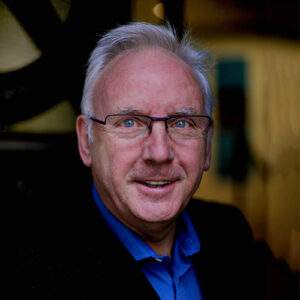Last week, BCIMO announced the addition of Railway Benefit Fund as one of the charities being supported by its Family Day on the 17th May, and that its President, Pete Waterman OBE, will be opening the event. In this week’s article, they talked to Pete about his own personal journey in and lifelong passion for rail.
Reflecting on how his own railway ‘journey’ began, Pete talked about his childhood in the West Midlands growing up next to a busy railway line where you either learned to “love them or hate them” and how, in 1947, he was “born to the sound of engines chugging past my cot”. “Railways were part of the fabric of how you grew up” in those days, with buses for local journeys and no cars for most families, “you couldn’t go anywhere without going on a train”. He remembered it as being “an event… an experience”, and that there was a something of an aspirational “aura about the railways” for working class people; also highlighting the “very important” role of train drivers then as respected “pillars of the community”. And for Pete, that’s where his “love” of rail began.

He left school in 1962 to work at a rail depot in Wolverhampton, but the depot closed a year later so, when asked about his onward career journey, Pete admitted that “had steam continued, I’d probably never have gone into the music industry” and would have “stayed the rest of my career” in rail. He said that his ideal job would have been as a boilersmith and when he took on a rail business later in life, his first task was to set up a boiler shop, as “if we were to keep steam alive, we’d need engineers who could repair boilers and do intricate work”. With many experienced such staff coming up to retirement, he worried the industry was “losing skills fast” and there was potential for those with experience to pass them on, although noting that the development of specialist skills in itself is a “lifetime journey”.
Having had his first model railway as a toddler in 1948, this specific journey for him both personally and in inspiring later generations of children has been wanting to “get young people involved in what model railways are all about”, and that again the social skills honed through that teamwork is so important. Although his own grandchildren haven’t followed in his footsteps, he wanted them to remember him as “a grandad who was passionate about railways” and “who fought for the railways all his life”.
This mission has, of course, encompassed Pete’s work with the Railway Benefit Fund (RBF) and, when asked why, he fondly stated that “railway people are fabulous to work with”, and the complexity of the railway community boats a “width of employment” from drivers to staff in all aspects of the sector. He also highlighted the importance of the industry in employing “people with slightly less skills” and qualifications, and looking after them, and that personally he “didn’t read or write until I was 30 years old” but “the railway gave me job”. He reiterated that the focus of RBF was to support all members of the railway family “in need”, and it has seen an increase in calls over time, with staff facing a complex range of difficulties both at work and at home.
As part of this need, is concerns about the future of the rail industry, not only as it goes through structural change, but as technology impacts on the roles within it. Pete sees this within the difficult debate that future trains “don’t need drivers” and whilst many believe it’s “never going to happen” and are fighting hard to keep the status quo with union support, it’s inevitable. One of the most significant impacts of this, in addition to the evolution of the workforce, is the potential loss of community that so enamoured Pete with rail as a teenager, and so the “question we face now” he believes is “how do you balance where we’re going” with the need for a railway ‘family’.
The very nature of rail over the past two centuries has been change, and Pete was clear that “we need to innovate all the time”, but again although “we have a 200-year-old infrastructure” he noted that we “also have engineers that have been with the railway for 40 years” who are “not easy persuaded with modern engineering practices”, so once again that balance needs to be found. The current dichotomy is essentially that there is “too much of a wish to move forward too quick, and too much of a wish to stay exactly how we’ve been for 200 years” which can’t work. He highlighted that in “dealing with infrastructure that’s been here… and been moving for 200 years” across thousands of miles of railway, we don’t have a choice but to innovate.
When asked about the specific impact of environmental change – which BCIMO addresses through its flagship Clean Futures innovation programme – alongside that imperative to change, Pete talked about the balance between preserving both the history of the railway and the natural landscape in context of passenger wants and needs as “the majority of young people want to get where they’re going faster than before” regardless. He did, however, quite rightly stress that “people forget our green credentials”, we “haven’t had steam” thus using coal “since 1967” and have traditionally “run our rolling stock into the ground” including via “cascading”, i.e., “give it to someone else to use” which is all very environmentally friendly.
But “when build a new railway” as per demand “you have to go into the green environment, you have to cut through the countryside”, which becomes “a major problem” for other stakeholders and is “very environmentally unfriendly”. Pete believes strongly that “we have to protect the environment, it’s crucial, but” queries” at what cost”, so again finding some kind of balance is key. Whilst various transitional technologies have emerged, he said that the “answer is a greener and more sustainable future” and that there also needs to be a focus on “reducing costs” so that this can happen. Throughout his time chatting to the BCIMO team, Pete talked passionately about the uniqueness of the UK rail landscape, its infrastructure and its diversity – and particularly its community – and believes that it is even “more relevant today than it was 200 years ago”.

Pete Waterman OBE, reflecting on his role as President of Railway Benefit Fund said:
“I’m a big fan of the RBF, I have been for 25 years, and am proud to be their President and help raise the profile of the great work we do. The history of the charity is just incredible, some of its patrons in the past have included Charles Dickens. It’s so rewarding to be a part of a charity which supports railway people facing hardship in the UK.”

Helen Wolf, Marketing & Commercial Officer at BCIMO, who interviewed Pete for this article, said:
“Spending time with Pete was a real pleasure, as he is someone that, like me and the team, is passionate about the rail industry from its history to its future. The incredible space we have at the Very Light Rail National Innovation Centre in Dudley, with its mid-19th century infrastructure, 21st century facilities, and thus at the forefront of rail innovation and inspiring future generations whilst preserving its heritage and traditions, is the perfect example of the balance he also talked so passionately about. We’re really looking forward to welcoming him back to Dudley to meet our own BCIMO railway ‘family’, as we support Railway Benefit Fund on Family Day in May.”
For more information on BCIMO or the VLRNIC, please visit the BCIMO website or click Contact Us to make an enquiry / sign up to our mailing list.

BCIMO is a not-for-profit Research and Technology Organisation (RTO) and operator of the Very Light Rail National Innovation Centre (VLRNIC), a unique, world-class centre for rail innovation based in Dudley in the West Midlands.

Google Map Location: BCIMO
what3words Address: ///shades.glue.tile
Sat Nav: DY1 4AL
Postal Address: BCIMO, Very Light Rail National Innovation Centre, Zoological Drive, Dudley. DY1 4AW
Email: info@bcimo.co.uk
Phone: 07769 586893
